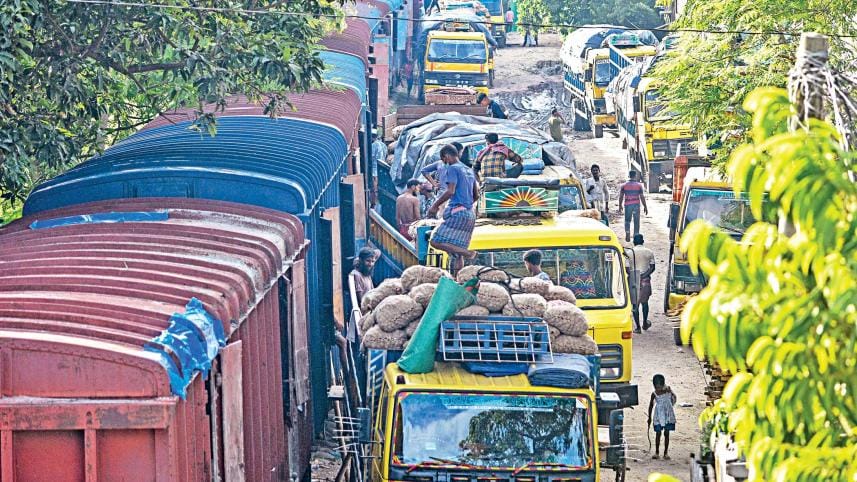Trade with India in rupee not feasible

Businesses will not be able to use the Indian rupee for trading with India as the Bangladesh Bank has not enlisted the currency for the settlement of bills for exports and imports.
The BB on September 15 allowed local banks to maintain accounts with their corresponding lenders or branches abroad in the Chinese yuan to help local businesses carry out foreign trade transactions using the currency of the world's second-largest economy.
Similar instructions will have to be issued by the central banks of both Bangladesh and India for allowing local businesses to settle letters of credit (LCs) using the rupee and the taka, according to commercial and central bank officials.
Unless the BB officially allows the settlement of LCs using currencies of both the countries, this would not be possible, they said.
Currently, local businesses can settle their export and imports using eight foreign currencies: the US dollar, Canadian dollar, Australian dollar, Singapore dollar, euro, Great Britain pound, Swiss franc, and the Chinese yuan.
The issue of using local currencies to clear the international bills came to the fore after the State Bank of India (SBI) issued a notice on August 24 where it suggested its branches not to assume US dollar or other foreign currencies exposure to Bangladesh till further instructions.
However, exposures in the Indian rupee and the taka will continue as hitherto, it said.
According to the notice, Bangladesh is categorised under the high-risk and under caution risk category as per SBI's country risk model.
It noted that the country is facing a shortage of foreign currencies due to higher import bills and the weakness of the taka against the US dollar in recent times.
SBI's Dhaka office did not respond to The Daily Star's request for comments.
Md Serajul Islam, spokesperson of the BB, declined to comment on the issue.
Bangladesh, which boasted a foreign currency reserve of $48 billion in August 2021, saw it go down to $37.13 billion recently as import bills surpassed exports and remittances.
Its currency, taka, depreciated by 20 per cent against the dollar to Tk 102.56 per dollar.
If trade between the two countries takes place in the rupee and the taka instead of the American greenback, the forex market volatility would reduce to some extent, entrepreneurs say.
This is because if India and Bangladesh permit the use of their local currencies to settle bilateral trade, the requirement for the US dollar will decline.
India was the second-largest source of imports for Bangladesh in the fiscal year 2021-22. Industrial raw materials, capital machinery, cotton, yarn, fabrics, and chemicals worth $16.19 billion were imported in the year.
Bangladesh exported goods worth $2 billion to the neighbouring country the same year.
"Even if all the bilateral trade can't be conducted in the taka and the rupee, at least $2 billion worth of trade, which is equivalent to what Bangladesh exports, can be in local currencies," said Abdul Matlub Ahmad, president of the India-Bangladesh Chamber of Commerce and Industry.
"Experts of both countries can sit together to find a solution so that the whole of the bilateral trade can be transacted in the taka and rupee."
He argues that there will also be a positive impact on the prices of basic commodities as the purchase of the US dollar costs extra money in the present volatile global currency markets.
"Similarly, it is possible to trade in the yuan and the Russian ruble to retain US dollar reserves," Ahmad said.
Mohammad Ali Khokon, president of the Bangladesh Textile Mills Association, also welcomed the idea of carrying out trade in the taka and the rupee.
The pressure from falling US dollar reserves will reduce to a great extent as Bangladesh imports a lot of industrial raw materials and goods from India," he said.
Md Saiful Islam, president of the Metropolitan Chamber of Commerce and Industry, said had there been no special terms and conditions and trade had taken place normally, the taka-rupee trade would be beneficial for both countries.
"If Indian businesspeople accept the taka and their Bangladeshi counterparts accept the rupee, there would be no problem," said Mohammad Hatem, executive president of the Bangladesh Knitwear Manufacturers and Exporters Association.
Rizwan Rahman, president of the Dhaka Chamber of Commerce and Industry, suggested holding consultations with experts so that bilateral transactions can be conducted in the local currencies as soon as possible.
Ahsan H Mansur, executive director of the Policy Research Institute of Bangladesh, said enabling a vibrant trade environment in the rupee and taka would require years but the BB can start the process from now.
The economist, however, warned that Indian businesses might not initially show interest in doing foreign trade using the taka instead of the dollar.





 For all latest news, follow The Daily Star's Google News channel.
For all latest news, follow The Daily Star's Google News channel.
Comments